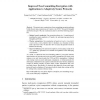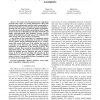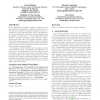31 search results - page 3 / 7 » On the Hardness of Information-Theoretic Multiparty Computat... |
ASIACRYPT
2009
Springer
14 years 2 months ago
2009
Springer
We present a new construction of non-committing encryption schemes. Unlike the previous constructions of Canetti et al. (STOC ’96) and of Damg˚ard and Nielsen (Crypto ’00), ou...
FOCS
2010
IEEE
13 years 5 months ago
2010
IEEE
We construct the first general secure computation protocols that require no trusted infrastructure other than authenticated communication, and that satisfy a meaningful notion of s...
PODC
2012
ACM
11 years 9 months ago
2012
ACM
Multi-party communication complexity involves distributed computation of a function over inputs held by multiple distributed players. A key focus of distributed computing research...
CCS
2009
ACM
14 years 2 months ago
2009
ACM
Most cryptographic algorithms provide a means for secret and authentic communication. However, under many circumstances, the ability to repudiate messages or deny a conversation i...
FOCS
1999
IEEE
13 years 11 months ago
1999
IEEE
Various efforts ([?, ?, ?]) have been made in recent years to derandomize probabilistic algorithms using the complexity theoretic assumption that there exists a problem in E = dti...



